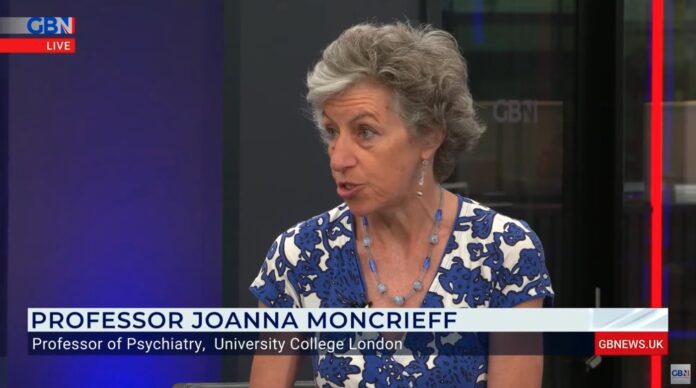A long-held belief in medicine that a lack of the brain chemical serotonin is to blame for depression may be wrong, according to the lead author of a new study into the illness.
Joanna Moncrieff, professor of critical and social psychiatry at University College London, spoke about the findings of the study in an exclusive interview during Breakfast with Eamonn Holmes and Isabel Webster on GB News.
She explained: “There’s been an idea around for a long time that actually the evidence about serotonin doesn’t stack up.
“There are studies out there that are negative or inconclusive, but no one before has got all the research together and looked at it in total and found that not one single area of research on serotonin, at least the main areas, really provides any convincing evidence that depression is associated with low serotonin levels.”
Asked what is the true cause, Professor Moncrieff said: “That’s the million dollar question, of course. There’s research going on into lots of other possible biological causes and has been for decades but none of them have come up with any more convincing evidence than the evidence on serotonin.
“The evidence on serotonin is one of the areas that’s been most thoroughly researched over the last few decades.
“My interpretation of this research is that we need to look at depression differently. We need to stop seeing it as a brain disorder and start understanding it as an emotional reaction to people’s circumstances.”
She added: “The justification for using antidepressants, particularly the new type the SSRIs that were introduced in the 1990s – that stands for Serotonin Selective Re-uptake Inhibitors…
“The justification for their use was the idea that they would boost serotonin levels by blocking the transporter protein that takes the serotonin out of the synapses and basically deactivates it.
“This paper is showing that if there’s no association between depression and serotonin – that justification for using antidepressants isn’t there.
“In other words, we really don’t have evidence that they are rectifying an underlying abnormality.”
Professor Moncrieff said: “Depression is different with everyone that has it, and that’s because the causes of depression are different in everyone that has it.
“The first thing is to tackle the causes, is to address why someone is depressed. There are lots of things about modern society that make people susceptible to depression.
“We live in very stressful times, huge cost of living crisis, so many people in debt, loneliness is rife.”
She said it was crucial that people taking antidepressants should continue to do so, though: “I think it’s a very important message to get across to people that people shouldn’t stop these tablets suddenly.
“If they do decide they want to try and come off them that should be done slowly and gradually and with support.
“That’s very important to say but the research on antidepressants actually shows they are only marginally better than a placebo tablet, so an awful lot of the effect of the antidepressant is the hope that people get from taking a tablet.
“And that is an important message in itself, that actually giving people hope and support, letting people know that other people care and are trying to help them, that in itself is helpful.
“The other way that I think antidepressants sometimes work is that they can block or blunt people’s emotions and they do that across the board.
“That’s not just an effect on depression, that’s an effect on positive emotions, too. And so when people are in a really, really bad place, maybe that can take the edge off but it has negative consequences too.”
Asked about scarcity of resources in mental health, she said: “They’re better than they were. We do have counselling services but there’s still a wait for most people and that is difficult.
“The point is, though, that from the scientific point of view, we have to be sure that our treatments are effective and that they’re doing more good than harm and the worry is that if antidepressants aren’t doing what we thought they were doing, are they really doing more good than harm?”
She was asked if depression as on the increase, and said: “I didn’t know, I couldn’t sort of scientifically say whether there’s been an increase or not but I would say that there is a huge huge amount of suffering out there which is related to people’s the difficulties people are having with everyday life working in general practice, or in a service that takes referrals from general practice, that there is a tidal wave of misery out there.
“There really are a lot of people just struggling to get through.”
She added: “This is something that comes to an end and if people can get through it there is light at the end of the tunnel, even people with really severe depression.
“I was talking to a doctor last night in an educational session who’d had really severe depression for many years but had got over it.
“What she said had helped her was understanding both what had made her vulnerable what has had been about her childhood that made her vulnerable, what the circumstances were that had brought it on in the first place, and learning to live with really difficult and unpleasant emotions which took her a long time but she did manage to do in the end.”
Help keep news FREE for our readers
Supporting your local community newspaper/online news outlet is crucial now more than ever. If you believe in independent journalism, then consider making a valuable contribution by making a one-time or monthly donation. We operate in rural areas where providing unbiased news can be challenging. Read More About Supporting The West Wales Chronicle






















